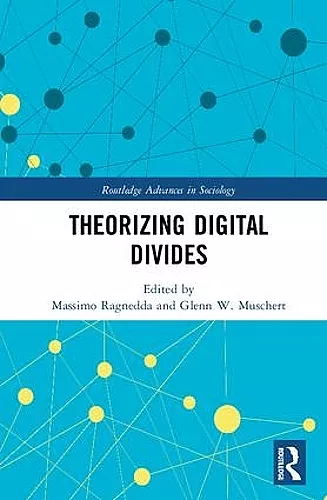Theorizing Digital Divides
Massimo Ragnedda editor Glenn W Muschert editor
Format:Hardback
Publisher:Taylor & Francis Ltd
Published:2nd Oct '17
Currently unavailable, and unfortunately no date known when it will be back
This hardback is available in another edition too:
- Paperback£46.99(9780367890254)

Although discussion of the digital divide is a relatively new phenomenon, social inequality is a deeply entrenched part of our current social world and is now reproduced in the digital sphere. Such inequalities have been described in multiple traditions of social thought and theoretical approaches. To move forward to a greater understanding of the nuanced dynamics of digital inequality, we need the theoretical lenses to interpret the meaning of what has been observed as digital inequality.
This volume examines and explains the phenomenon of digital divides and digital inequalities from a theoretical perspective. Indeed, with there being a limited amount of theoretical research on the digital divide so far, Theorizing Digital Divides seeks to collect and analyse different perspectives and theoretical approaches in analysing digital inequalities, and thus propose a nuanced approach to study the digital divide.
Exploring theories from diverse perspectives within the social sciences whilst presenting clear examples of how each theory is applied in digital divide research, this book will appeal to scholars and undergraduate and postgraduate students interested in sociology of inequality, digital culture, Internet studies, mass communication, social theory, sociology, and media studies.
Digital divides have been long thought of in terms of access and skills. These are still important, but the essays in this volume challenge and go beyond this way of thinking. They examine not just many overlooked examples of divides but also bring to bear fresh theoretical perspectives. This book will open up exciting new directions for the next generation of internet researchers.
Professor Ralph Schroeder, Oxford Internet Institute, University of Oxford, UK
This is a welcome volume that develops our understanding of digital divides. It does so through a highly informed understanding of current theoretical knowledge of digital divides in a range of disciplinary perspectives. The authors combine to extend this knowledge in meaningful ways to address the nuances and complexities of digital divides. The theoretical developments will be extremely beneficial for scholars and students working in the area of digital divides.
Bridgette Wessels, Professor of Sociology, Newcastle University, UK
This book provides a much-needed wide-ranging theoretical foundation for research on the digital divide. While scholars and activists have done yeoman’s work identifying, studying and narrowing digital divides, Ragnedda and Muschert have put together the theoretical infrastructure with which we may understand past efforts and move forward with new ones.
Steve Jones, UIC Distinguished Professor of Communication, University of Illinois at Chicago, USA
The book is most valuable for the sociologist searching for ways to approach digital phenomena (students and early career researchers) rather than policymakers, opinion formers or our engineer wishing for guidance. All the chapters agree that our understanding has moved on during the century, that the simple question of access has been trumped by a second level of inequality of skills and education, and even a third level of unequal abilities to gain social goods from online activity. The breadth of Theorizing Digital Divides coverage is a virtue.
Kieron O’Hara, University of Southampton, UK, European Journal of Communication
ISBN: 9781138210400
Dimensions: unknown
Weight: 560g
212 pages